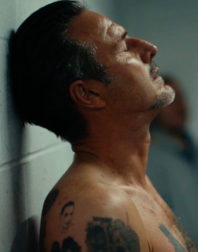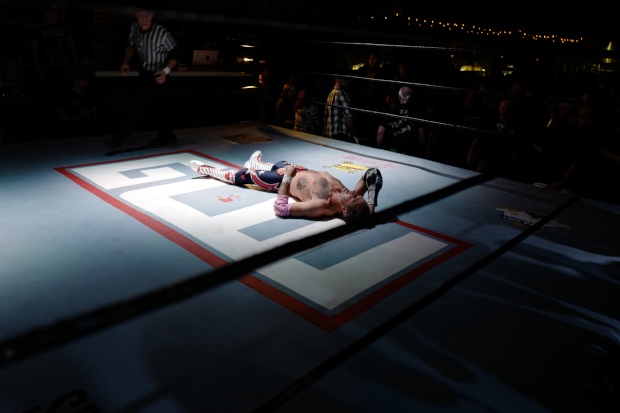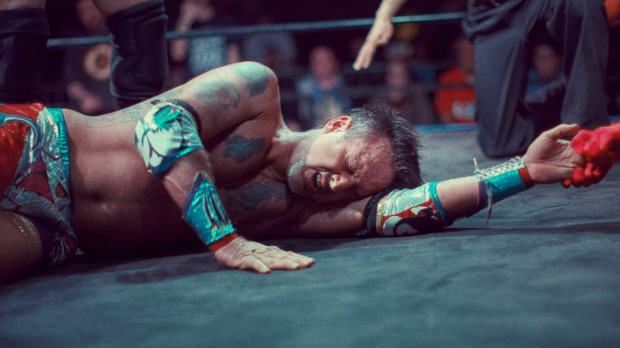
Never being much a wrestling fan myself, I guess it’s understandable that I had totally forgotten about David Arquette’s brief foray into the WCW back at the turn of the millennium. Even so, for an actor that was such a visible part of my movie-watching adolescence, I was a little shocked of my ignorance towards this important milestone in contemporary culture. If any other actor had flaunted themselves in the professional wresting ring, maybe it would have caused more of a stir; but for a committed joker like Arquette, I guess it was just a natural progression. Nevertheless, the buzzy new documentary You Cannot Kill David Arquette is now here to set the record straight, turning an amusing footnote in pop culture history into the stuff legends are made of.
A quick recap – in the spring of 2000, to promote the release of the WCW-sanctioned wrestling buddy comedy Ready to Rumble, Arquette made a series of appearances on WCW as a new contender. Thrust into storylines with Diamond Dallas Page, Jeff Jarrett, Eric Bischoff and more, the stunt eventually culminated in Arquette winning the WCW World Heavyweight Championship in a shocking upset. Fans immediately derided the move and Arquette was pilloried, much to the dismay of the actor himself, who had always been a major wrestling fan and was also against the idea of being named the victor. When the WCW was bought out by the WWE soon after, Arquette was often named as one of the chief reasons for its decline.
Directed by newcomers David Darg and Price James, You Cannot Kill David Arquette reflects on this moment of entertaining lunacy while following the actor as he makes his comeback to the world of wrestling in 2018. This time it’s more than just a corporate publicity stunt, as we see Arquette seriously train and participate in amateur contests all over North America to build up his fighting reputation and “prove himself” to the real wrestling fans that have considered him a laughingstock for the last 18 years. In this way, the doc actually proves to be more fascinating as a look into the actual grassroots culture of wrestling, beyond the glitz and glamour of what you see on television. In one of the film’s best sequences, Arquette enters into an amateur wrestling match that takes place in someone’s woodsy backyard and promptly gets the shit kicked out of him by a group of young fighters salivating at the prospect of taking this Hollywood wimp down a notch and showing him what wrestling’s really about. This “code” that all serious wrestlers share, and Arquette’s disrespect towards it during his initial WCW run, is an interesting thread that runs through the whole film, whether you’re a wrestling fan or not.
I may not have paid any attention to Arquette’s WCW shenanigans back in the day but I certainly remember eagerly renting Ready to Rumble from the video store as a 13-year old, an age where any dumb-looking buddy comedy was cause for celebration. Directed by Brian Robbins (sandwiched in between his better-remembered sports movie efforts, Varsity Blues and Hardball) and written by Steven Brill (the prophet who created The Mighty Ducks), Ready to Rumble featured Arquette and Scott Caan as absolutely idiotic small town friends who travel to the big city to help their wrestling icon Jimmy the King (a bizarrely cast Oliver Platt) regain his former WCW glory. It’s a movie that’s not afraid to use literal shit as its main comedic inspiration (Arquette and Caan’s characters begin the film as septic-tank pumpers, leading to pretty much all the juvenile gags you can think of) while trotting out tons of real wrestlers for cameos, including a blink-and-you’ll-miss-it appearance by a young John Cena.

Ready to Rumble was, unsurprisingly, piledrived by critics and a major box office bomb, barely recouping half of its budget. Revisiting it 20 years later, there’s no question it’s a terrible film, filled with wall-to-wall obnoxious mugging from both of its leads as well as a rampant streak of unapologetic homophobia and misogyny that was sadly de rigueur for comedies of that era. Still, there are a few inspired moments that succeed in meshing the loony mugging of wrestling with the silver screen, particularly in an early fantasy showdown between Arquette and an unsavory clerk at a convenience store (once you get past the butt-sniffing joke that precedes it, of course).
During a roundtable press conference for the documentary’s premiere at Fantasia this past week, I took the opportunity to ask Arquette about his experience making Ready to Rumble. To him, it was a no-brainer to sign on for it at the time. “When I first read it,” Arquette reminisced, “it was like page 8 and they said ‘Macho Man Randy Savage’. I called my agent and I was like, ‘Do they have Macho Man Randy Savage for this movie?’ And they’re like, ‘Yeah, he’s signed up.’ So I’m like, ‘I’ll do it!’”
And despite the eventual reaction, it still seemed like a positive experience overall and one that had its own small influence on the doc. “I thought Ready to Rumble was a really fun movie,” Arquette states. “I wanted to do this almost as an unofficial sequel.”
Unfortunately, the fallout from Ready to Rumble (alongside his subsequent blonde bowl-cut turn in See Spot Run) did spell doom for Arquette’s viability as a leading man in Hollywood, something the doc briefly touches on. In one talking head interview, his wife, Christina McLarty, laments the promise Arquette had as a young actor before being typecast as a goofball in the late 90s. It’s a statement that doesn’t really ring true, however, as Arquette always embraced that goofball status, through his trademark turns as Deputy Dewey Riley or as Drew Barrymore’s lovably moronic older brother in Never Been Kissed. It may be true that Hollywood turned its back on him, as they do with scores and scores of actors, but comedy was always in his veins, starting right from his breakout role in the Buffy the Vampire Slayer movie and even feeding into more offbeat choices like his supporting turn in Antonia Bird’s Ravenous. And despite what the doc surmises, it’s not like many of his dramatic indie film performances from that time are held in that high regard (Johns? Dream With the Fishes? The Alarmist? Anyone? Anyone?).

It’s one of a few moments in You Cannot Kill Arquette that seems sneakily constructed to tell the time-honoured story of a once-bright Hollywood star struggling to reclaim his legacy, even if that’s not what’s really going on here. To be sure, it’s still a crowd-pleasing film but one that leans more towards mainstream techniques in telling its tale (and a borderline gag that sees Arquette get a much-too-dark tan to enhance his wrestling physique seems like it was taken right from the outtakes of Ready to Rumble). You’ll certainly leave the film with a smile on your face but there are still more pertinent questions that will linger on your mind – like, what are the similarities between the performative worlds of Hollywood and wrestling, now that he’s been involved so intimately in both? The film never says (and I never got the chance to ask him).
By the end of the film, Arquette still remains somewhat of an enigma as well, with vague illusions to his mental health, intermittent alcoholism, and childhood struggles left to be hinted at by famous siblings Patricia and Rosanna Arquette and ex-wife Courteney Cox. By turning himself into a wrestling persona, does ‘David Arquette’ even exist as an everyday person anymore? Or does any celebrity, really? Unfortunately, this isn’t really the film to significantly go down those roads.
At least Arquette seems to have truly reached his final form in this new phase of his life. And maybe that’s the best that anyone could have hoped for.

